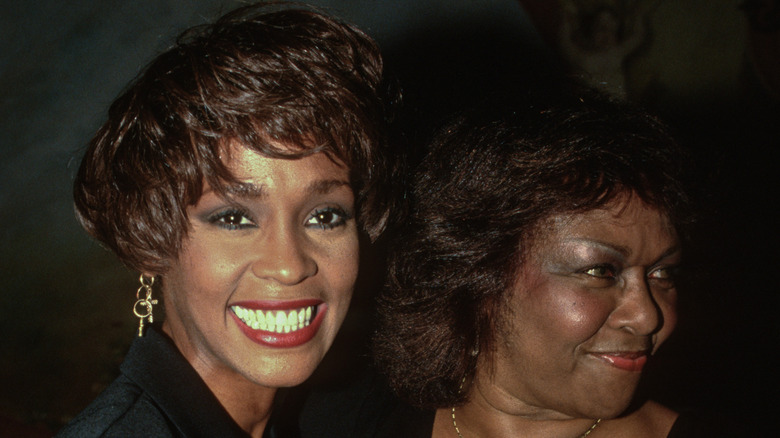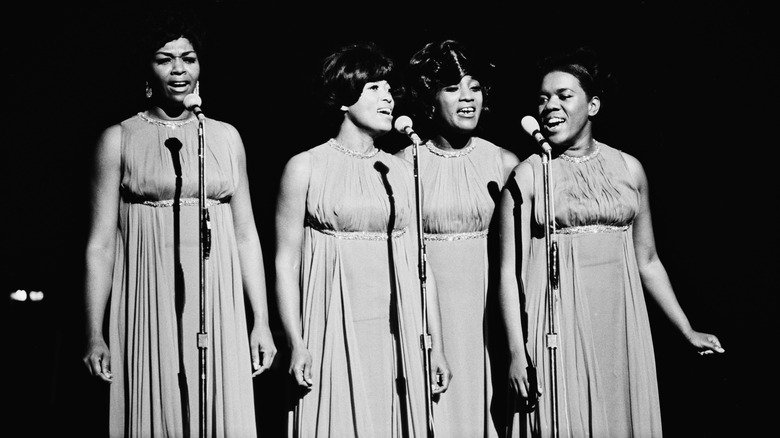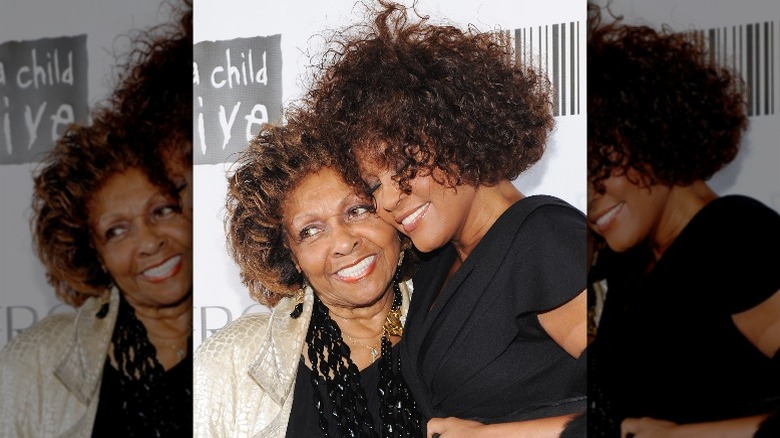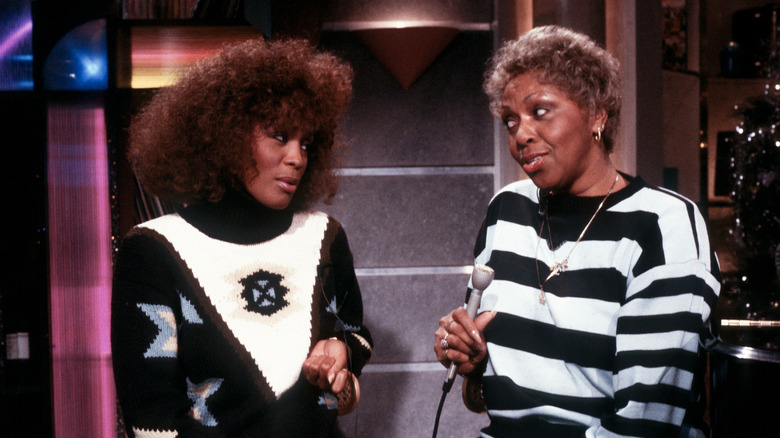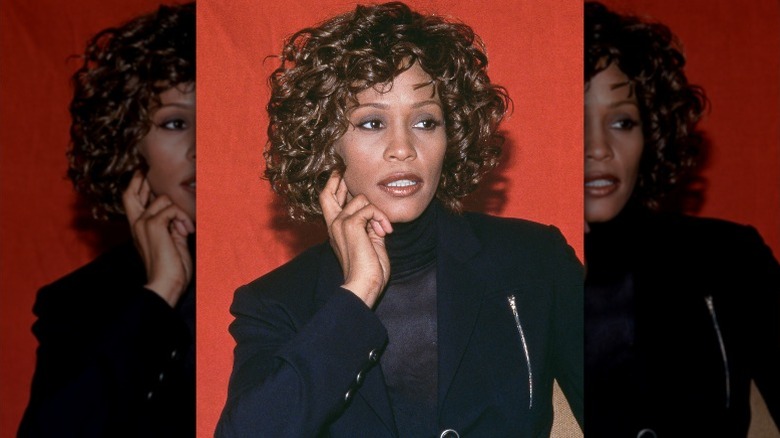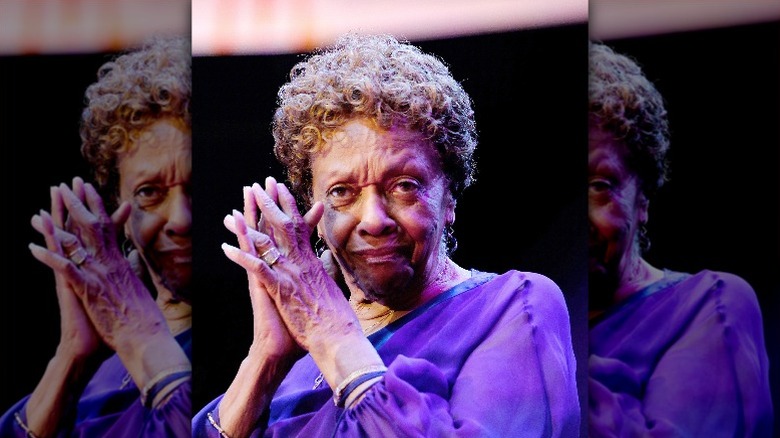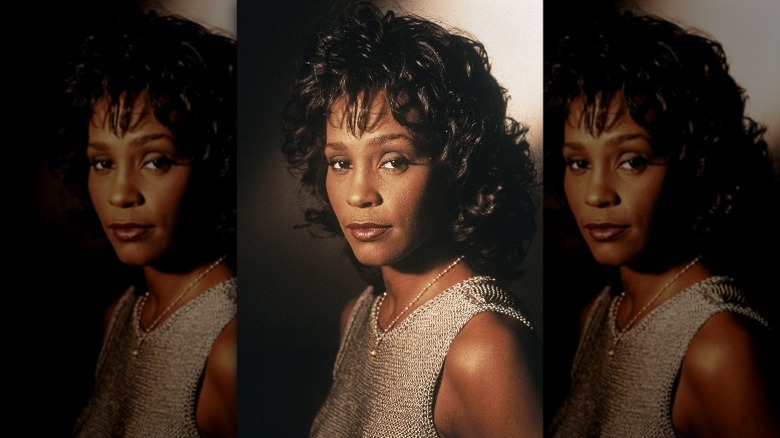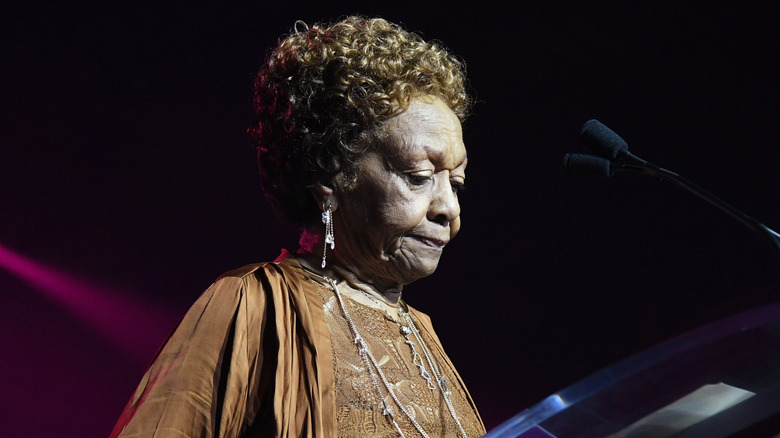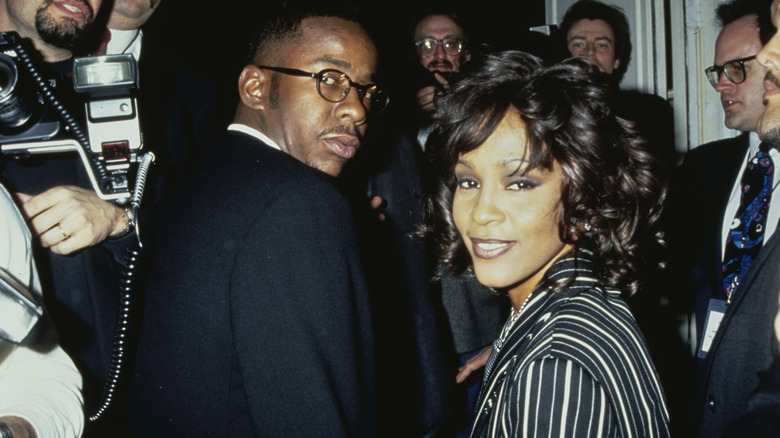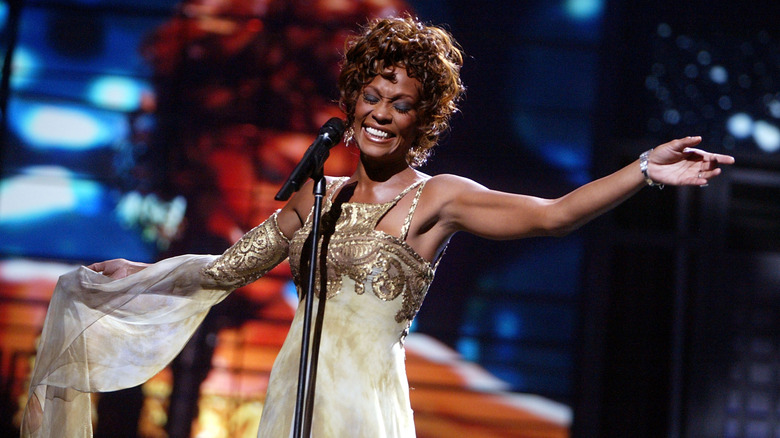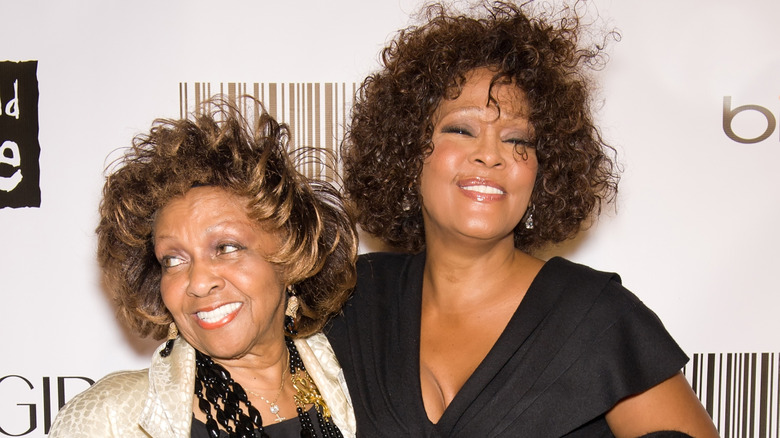Whitney Houston's Relationship With Her Mother, Cissy Houston, Explained
Star Whitney Houston is famous for her musical career, wowing audiences with her beautiful vocals from a young age. She rose quickly to stardom in the 1980s, putting out hit singles and albums and even making a name for herself on the screen. That fame began to diminish as the 2000s rolled on, and eventually, Houston's life story became something of a tragedy. Amidst a number of rumors regarding her private life — as well as other rumors about a potential comeback — she was found dead in a hotel bathtub on February 11, 2012, of an accidental drowning at the age of 48.
That's the story as it's well known, though one of the other parts of Houston's life that's often talked about is the singer's relationship with her mother, Cissy Houston. Cissy was an accomplished gospel singer, and, as such, she and Whitney (nicknamed "Nippy" by her family) collaborated when it came to making art. Most of the time, both their professional and personal relationships were quite positive.
That said, not everything was quite so rose colored, and the relationship between the two could vary wildly — sometimes loving and other times fraught, especially when Whitney's drug use became widely known. It was a complicated dynamic — featuring its fair share of ups and downs over the years — that came back into the spotlight with Cissy's death in early October 2024. Here are a few of those details.
Cissy Houston got her daughter into music
While Whitney Houston is generally the name better known in this day and age, there's no denying that Cissy Houston was something of a giant when it came to soul and gospel music. She got started as a small-town church performer but eventually entered the music industry as a backup singer for soul legends such as Dionne Warwick, eventually going on to perform with some pretty famous names — Aretha Franklin, Elvis Presley, Jimi Hendrix, and Beyoncé among them. Her career even saw her netting two Grammy Awards for her work.
In a lot of ways, when Whitney Houston was born, it seemed like music was just in her blood. Cissy ran the youth choir at Newark's New Hope Baptist Church, where her daughter would eventually start singing. Not only that, but the list of people that young Whitney knew included her mother's friends, who were nothing less than an assortment of musical greats. Franklin was one of those close personal friends, while Dionne and Dee Dee Warwick were actually her cousins.
The strange thing, though, is that all of those factors might have pushed Whitney toward a future that Cissy didn't want for her daughter. Despite all of those stars seemingly aligning, Cissy has since gone on record to say that she tried to keep her daughter away from the entertainment industry.
The pair worked together on a number of projects
While there's a lot to be said about the personal relationship between Whitney and Cissy Houston, there's also the professional side to all of this, as the mother and daughter worked together on a number of projects. In fact, Cissy would even bring her daughter into the studio so that the two of them could provide background vocals together, showing Whitney the ropes when it came to show business. Eventually, the two appeared together during Whitney's national debut on "The Merv Griffin Show" back in 1983; Whitney sang a solo piece from the musical "The Wiz," but she and her mother combined their talents on a medley of Aretha Franklin hits. Cissy even admitted that Whitney was scared to perform alone, recounting in her memoir (via USA Today), "One night I finally decided that the only way to get her up there was to fake being sick. I convinced Nippy to perform in my place, and she never looked back."
All of that was just the beginning. They would go on to perform together in concerts over the years, and Cissy would sing backup vocals on Whitney's multi-platinum first album; one song — "I Know Him So Well" — even saw the two of them sharing lead vocal duties.
What's more, their collaborations went beyond the music world. The 1996 movie "The Preacher's Wife" saw Whitney playing the lead alongside Denzel Washington, and Cissy made an appearance as a member of the church choir.
Their relationship was contentious at times
The relationship between mother and daughter wasn't always a pretty one. Cissy Houston addressed that dynamic in a number of stories she told about her daughter.
She made some general comments in her memoir "Remembering Whitney: My Story of Love, Loss, and the Night the Music Stopped," explaining that her daughter was occasionally prone to lashing out in fits of anger. In her own words, she writes, "[Whitney could] be nasty if she wanted to, but almost always, she was the sweetest, most loving person in the room" (via ABC News).
Despite this apparent tension, Cissy would typically take the time to try and meet up with her daughter during her tours (even if, by all accounts, the presence of Whitney Houston's mother wasn't particularly appreciated by the singer's social circle). But despite those attempts to close the gap between them, Cissy admitted that her daughter was often pretty distant, not calling or visiting her all that often — certainly not as much as she would have liked. In fact, she even confided that, in particularly low moments, she didn't know what exactly to think of their relationship, admitting in her memoir (via CBS News), "In my darkest moments, I wonder whether Nippy loved me."
Whitney Houston had a creative nickname for her mother
The relationship between Cissy and Whitney Houston is a complicated topic, given how it varied heavily over the years. In keeping with that, Whitney had a fairly creative name for her mother — one that didn't seem to have the most positive of connotations.
Whitney and her friends had taken to calling Cissy "Big Cuda," comparing her to a barracuda — seemingly not the most flattering of images. That said, Cissy was asked about this nickname in an interview with Oprah Winfrey, and she laughed it off, admitting that she most likely deserved it. As for why? Cissy had essentially made a reputation for herself among Whitney's social circle as the big, scary mother who would show up when things needed to get fixed. As she said herself, "I didn't take nothing from none of them, and I didn't like them ... if something went wrong on the road and she couldn't handle it, then she'd call me."
Cissy Houston was shocked by her daughter's drug use
The life of a celebrity is no easy thing, and there are plenty of negative effects to come from fame. In this case, the decline of an impressive career — and the unexpected day of Whitney Houston's early death — are often linked to drug use, and her close friends have gone on record saying that the pressures of fame were largely to blame for that. A lot of expectations, often regarding how she should look and act, were forced upon Whitney at an early age, even if that image didn't align with who she truly was. Drugs such as cocaine became her way of fighting those expectations by the time she was in her early 20s.
Cissy Houston was, evidently, relatively unaware of this. At one point, she decided to go pay her daughter a visit at her New Jersey home, intending to surprise her. But this wouldn't turn out to be a fun, impromptu visit; instead, she found that her daughter had been using drugs, which came as a complete shock. She recalls the incident in her memoir (via ABC News): "I had never seen anything like that before — her eyes were glassy and she was completely out of it. I said, 'Nippy, what the hell are you doing?'" Whitney tried to argue that nothing was wrong — that she wasn't addicted to drugs — but it wasn't long before Cissy determined that she had to intervene.
Whitney Houston tried to hide her drug use
According to sources close to the singer, the exact way in which Whitney Houston interacted with drugs changed somewhat over time. Eventually, everyone in her inner circle knew, and things were bad enough that Whitney was occasionally cared for by her young daughter, Bobbi Kristina Brown (who also died young in 2015). Brown would, on occasion, have to answer the door and tell worried visitors that she'd put her mother to bed.
Before that point, Whitney was typically keen on keeping her drug use quiet, though that wasn't to say that people weren't aware that something was amiss. Still, Cissy later acknowledged that Whitney was very good at keeping those secrets, and she was forced to wonder whether she even knew her daughter at all.
Even after Cissy learned of her daughter's drug use, the secretive behavior didn't stop. Following an intervention, Whitney insisted that the two of them live together for a short while; if they just did that, she would be able to quit. Cissy agreed to that arrangement, but in the end, she found that her daughter spent most of her time hiding away in one room or another, refusing to interact with anyone else. When questioned, she promised that she wasn't doing anything, but the claim didn't hold up, with Cissy explaining in her memoir (via ABC News), "She spent too many hours hiding herself for me to believe that was true."
Cissy Houston came upon a shocking scene in Atlanta
As 2005 rolled around, Whitney Houston's drug addiction reached something of a tipping point, with her brother actually contacting Cissy Houston with concerns of fatal consequences. Cissy responded by taking the trip to her daughter's multi-million dollar home in Atlanta, Georgia, only to be disturbed by the scene that she found there.
Whitney's house was in disarray, but more distressing were the images spray-painted all over the walls, which Cissy described in her memoir as "big glaring eyes and strange faces. Evil eyes, staring out like a threat" (via Toronto Sun). As she made her way through the rest of the house, she found even more dark imagery — namely, framed family portraits that depicted Whitney with her husband and daughter, but with Whitney's face cut out. Eventually, Whitney appeared at the top of the stairs, and Cissy described the situation in simple terms: "[Whitney] looked like someone I didn't know" (via People). She'd already had a bad feeling, given the state of the house, but at that point, Cissy knew for certain that her daughter was in danger.
It took little time after that for the cops to get involved and take Whitney to rehab — something which the singer eventually thanked her mother for, saying that the decision had ultimately saved her life. However, Cissy was always left wondering whether Whitney continued to resent her for the incident long after it had passed.
Bobby Brown was a complicated topic
Whitney Houston's marriage to Bobby Brown has always been a controversial topic, regardless of whether or not Cissy Houston was the one leading that discussion. As the story goes, the two were always considered something of a mismatched pair, and no small number of rumors followed them around. (Brown himself has even admitted that the marriage was doomed to fail.)
For her part, Cissy was rather vocal when it came to her opinions on the marriage, and those opinions weren't exactly positive. Depending on which accounts you read, it's possible that Cissy blamed Brown for Whitney taking drugs in the first place. However, not all reports agree on this point. In her memoir (via ABC News), Cissy writes that she didn't "blame Bobby for introducing Nippy to drugs or for the things that ended up happening to her."
That said, she didn't like Brown, either, and she stated in an interview with ABC News' Robin Roberts (via Singersroom), "I think if she had married somebody else ... it would have been better ... It just didn't work because he wasn't right for her." Cissy was pretty open about her belief that Brown was simply immature and jealous, and where drugs were concerned, while she didn't blame him directly for Whitney's death, she didn't think he helped, either. On the contrary, she believed that he made the process of addiction recovery harder for Whitney, even if unintentionally.
Things were looking up for a while
To say that there were ups and downs when it came to the relationship between Whitney and Cissy Houston would be something of an understatement. But for all the lows that the two of them experienced, the last period of Whitney's life contained one of those high points.
As Cissy writes in "Remembering Whitney: My Story of Life, Loss, and the Night the Music Stopped," around the end of 2011, Whitney had insisted that the family spend some time together, and Cissy spoke of the reunion with extreme fondness. Whitney was in particularly high spirits after filming the movie "Sparkle," and it suddenly felt like old times. Cissy even recalled that, at one point, Whitney laid her head in her mother's lap — something that she did rarely — and that the gesture was especially meaningful. "Those were the moments that bonded us together, and I cherished them," she wrote.
Over the coming weeks, Whitney seemed to be in a better place than she had been in years, though that wasn't destined to last. With the beginning of 2012 came the Grammy Awards, after which Whitney promised to return home to see her mother. But once she arrived in Los Angeles, Cissy noted a distinct sadness in her daughter's tone. She recounted Whitney's final words on their last phone call – "I'll be home soon, Mommy. I promise" — and that stuck with her, even if she didn't know exactly what her daughter was going through. Unfortunately, she never got an answer; Whitney died the day after that call was made.
Cissy Houston thought that her daughter was at the door one last time
Whitney Houston's death occurred on February 11, 2012, but that news didn't necessarily spread immediately. And in the hours before she learned her daughter had died, Cissy Houston had a strange moment in which she thought she would see her again — just like Whitney had promised her. On that day, she was home alone when the doorbell rang. And it kept on ringing, even though there was no one there when Cissy went to answer the door, or when she asked her building's concierge to check on the situation. Just moments later, her oldest son called her in a panic; Whitney had been found dead in her hotel room.
In the aftermath, that persistent, inexplicable doorbell began to mean something very different to Cissy; to her, it became more of a comfort than a mystery, like her daughter had actually come back to her. In her own words, from a letter she wrote to her late daughter: "You promised me you were coming to spend time with me after the Grammys. I believe the spirits allowed you to come after all" (via Essence).
And that feeling persisted long afterward, too, with little things — the sound of a doorbell, or a random piece of misplaced decor — sometimes making Cissy Houston feel as if her daughter was still around.
If you or anyone you know needs help with addiction issues, help is available. Visit the Substance Abuse and Mental Health Services Administration website or contact SAMHSA's National Helpline at 1-800-662-HELP (4357).
